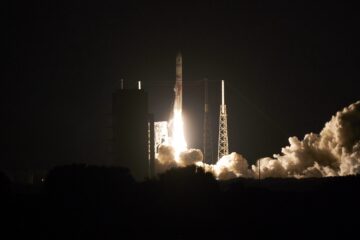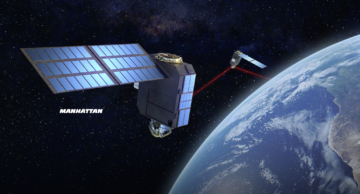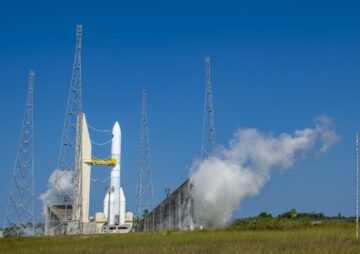
WASHINGTON — The U.S. Space Force is on the verge of finalizing a key strategy document outlining how it will partner with the burgeoning commercial space industry. After months of refinement, Deputy Chief of Space Operations Lt. Gen. DeAnna Burt announced Jan. 5 at the Mitchell Institute for Aerospace Studies that the document is nearing completion.
“We are just days away from signing off on the strategy,” Burt said.
This blueprint will guide the Space Force’s integration of commercial satellite services into its routine operations, aiming to leverage private sector innovation to strengthen U.S. military space systems.
“Historically we’ve worked with commercial to build a satellite or a rocket,” said Burt. “But how do we start to think about buying things as a service? I don’t have to own a satellite. I don’t have to own those things,” she added. “I think that is what we’re trying to also make sure we capture in the strategy.”
The Space Force started working on the strategy in February. But early drafts lacked the necessary detail to guide industry partners, Chief of Space Operations Gen. Chance Saltzman acknowledged last fall.
He suggested that the Space Force’s commercial strategy will be more than just a shopping list, and will serve as a roadmap for harnessing the capabilities of the private sector. He directed his staff to include “tangible guidance” in the strategy on questions like data procurement, asset ownership and the division of responsibilities between government and private entities.
While the Space Force has experience with commercial partnerships in areas like launch services, this strategy delves deeper, encompassing emerging technologies like rapid-revisit imaging and in-orbit surveillance. Burt emphasized the need for clear communication so industry players understand what gaps the Space Force is looking to fill.
Central questions loom about protection
At the Mitchell Institute event, Burt also shed light on talks Space Force officials have had with commercial space firms about potential protection of their satellites and data should a conflict extend into space. She indicated it would be up to U.S. Space Command to determine priority assets and level of support the military could provide.
Some companies aim to maintain neutrality given global customer bases, Burt noted. The situation parallels complications with safeguarding U.S.-flagged commercial vessels amid ongoing attacks in the Red Sea region believed to be carried out by Iran-backed Houthi rebels.
- SEO Powered Content & PR Distribution. Get Amplified Today.
- PlatoData.Network Vertical Generative Ai. Empower Yourself. Access Here.
- PlatoAiStream. Web3 Intelligence. Knowledge Amplified. Access Here.
- PlatoESG. Carbon, CleanTech, Energy, Environment, Solar, Waste Management. Access Here.
- PlatoHealth. Biotech and Clinical Trials Intelligence. Access Here.
- Source: https://spacenews.com/space-force-on-the-verge-of-finalizing-long-awaited-commercial-space-strategy/
- :has
- :is
- $UP
- a
- About
- added
- Aerospace
- After
- aim
- Aiming
- also
- Amid
- and
- announced
- ARE
- areas
- AS
- asset
- Assets
- At
- Attacks
- away
- BE
- believed
- between
- blueprint
- build
- burgeoning
- but
- Buying
- by
- capabilities
- capture
- carried
- Chance
- chief
- clear
- commercial
- Communication
- Companies
- completion
- complications
- conflict
- could
- customer
- data
- Days
- deeper
- deputy
- detail
- Determine
- directed
- Division
- do
- document
- Dont
- Early
- emerging
- emerging technologies
- emphasized
- encompassing
- entities
- Event
- experience
- extend
- Fall
- February
- fill
- firms
- For
- Force
- from
- gaps
- Gen
- given
- Global
- Government
- guide
- had
- Harnessing
- Have
- he
- his
- How
- HTTPS
- i
- Imaging
- in
- include
- indicated
- industry
- industry partners
- Innovation
- Institute
- integration
- into
- IT
- ITS
- Jan
- just
- Key
- Last
- launch
- Level
- Leverage
- light
- like
- List
- long-awaited
- looking
- loom
- maintain
- make
- Military
- months
- more
- nearing
- necessary
- Need
- neutrality
- noted
- of
- off
- officials
- on
- ongoing
- Operations
- or
- out
- outlining
- own
- ownership
- Parallels
- partner
- partners
- partnerships
- plato
- Plato Data Intelligence
- PlatoData
- players
- potential
- priority
- private
- private sector
- procurement
- protection
- provide
- Questions
- Red
- region
- responsibilities
- roadmap
- rocket
- routine
- s
- Said
- satellite
- satellites
- SEA
- sector
- serve
- service
- Services
- she
- shed
- Shopping
- should
- signing
- situation
- So
- Space
- Space Force
- space industry
- Staff
- start
- started
- Strategy
- Strengthen
- studies
- support
- sure
- surveillance
- Systems
- Talks
- Technologies
- than
- that
- The
- their
- things
- Think
- this
- those
- to
- trying
- u.s.
- U.S. Space Force
- understand
- verge
- we
- What
- will
- with
- worked
- working
- would
- zephyrnet









